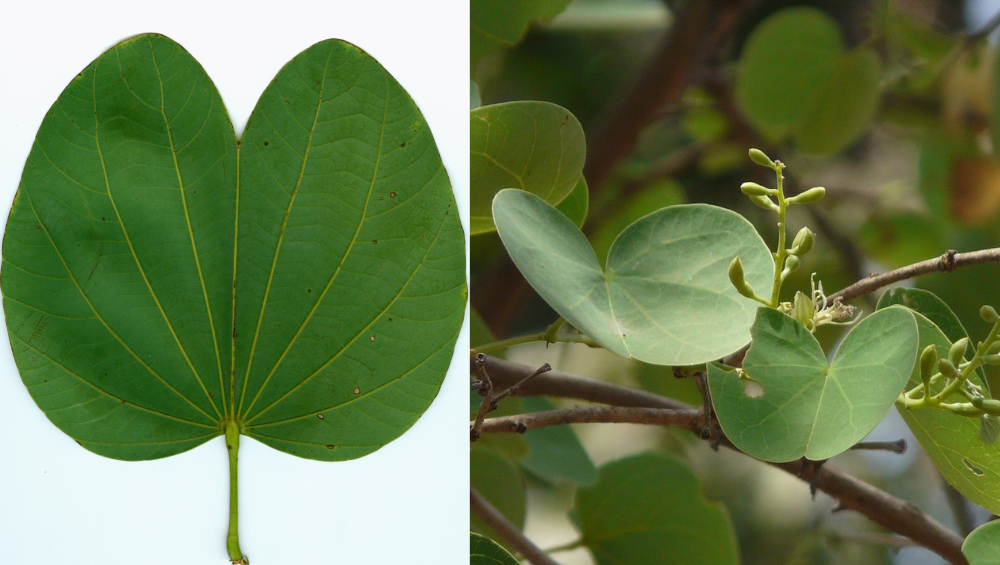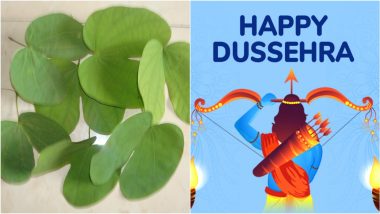Dussehra 2024 falls on October 12. Dussehra, also known as Vijayadashami, is one of the most significant festivals celebrated in India, marking the culmination of the nine-day Navaratri festival. The term "Vijayadashami" combines two words: 'vijaya,' meaning victory, and 'dashami,' referring to the tenth day. This festival symbolises the triumph of good over evil, commemorating the legendary battle where Lord Rama defeated the demon king Ravana, who had kidnapped Sita, Rama’s devoted wife. Happy Dussehra 2024 Greetings and Ram Ravan Antim Yudh Images: Wishes, WhatsApp Messages, Wallpapers and SMS to Share With Family and Friends.
Exchanging Apta Leaves on Dussehra
In Maharashtra, a unique tradition associated with Dussehra involves the exchange of Apta leaves, also known as the bidi leaf tree. These heart-shaped leaves, scientifically classified as Bauhinia racemosa, are regarded as symbols of wealth and prosperity. During the celebrations, people refer to these leaves as "sona," which translates to gold, further emphasising their significance.

The practice of exchanging Apta leaves has its roots in ancient folklore. One popular legend recounts how Maratha warriors, returning victorious from battles, would bring home treasures of gold and other riches. In gratitude, they would present these offerings to their deities and share their wealth with loved ones. Over time, as gold became increasingly valuable and scarce, Apta leaves began to serve as a substitute in this ritual of sharing and celebration. Thus, the leaves came to symbolise the gold that warriors once distributed.
Another enchanting tale associated with the Apta leaves involves a man named Kautsya, who lived in the city of Ayodhya. Guided by his guru Varatantu, Kautsya sought to present a token of gratitude to his teacher, who humbly refused to accept any gifts. In his quest for guidance, Kautsya approached Lord Rama, the revered ruler of Ayodhya. Following Rama's instruction, Kautsya waited patiently beneath an Apta tree. After three days, a miraculous event occurred—the leaves of the tree transformed into gold, showering him in a radiant display of wealth. This miracle, attributed to Lord Kubera, the god of riches, further solidified the connection between Apta leaves and prosperity.
On Dussehra, it is customary to place a plate filled with Apta leaves in front of deities during prayers. As part of the festivities, these leaves are exchanged among friends and family, reinforcing the idea of sharing blessings and abundance. The act of giving and receiving Apta leaves symbolises the sharing of prosperity and goodwill, making it an integral aspect of the Dussehra celebrations.
Apta leaves hold a deep cultural and symbolic significance during Dussehra. They serve as a reminder of historical customs, embodying the spirit of generosity and the triumph of good over evil. As families come together to celebrate this vibrant festival, the exchange of Apta leaves enriches the festivities, celebrating both heritage and the hope for a prosperous future.
(Disclaimer: The information provided here is based on beliefs and legends only. Before applying any information in real life, consult the concerned expert.)
(The above story first appeared on LatestLY on Oct 12, 2024 08:10 AM IST. For more news and updates on politics, world, sports, entertainment and lifestyle, log on to our website latestly.com).













 Quickly
Quickly





















